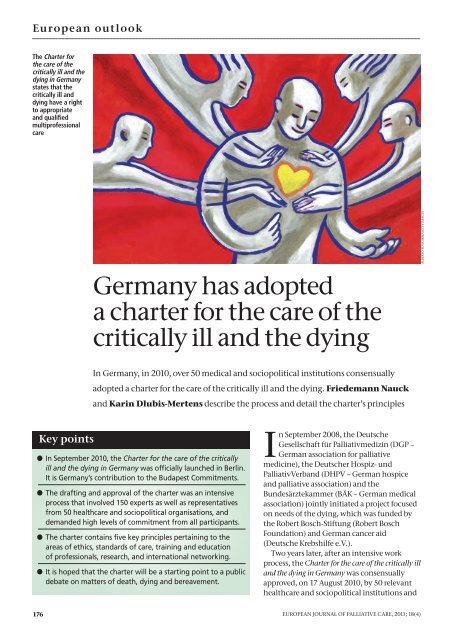Germany has adopted a charter for the care of the critically ill and ...
Germany has adopted a charter for the care of the critically ill and ...
Germany has adopted a charter for the care of the critically ill and ...
You also want an ePaper? Increase the reach of your titles
YUMPU automatically turns print PDFs into web optimized ePapers that Google loves.
Europe an outlook<br />
The Charter <strong>for</strong><br />
<strong>the</strong> <strong>care</strong> <strong>of</strong> <strong>the</strong><br />
<strong>critically</strong> <strong>ill</strong> <strong>and</strong> <strong>the</strong><br />
dying in <strong>Germany</strong><br />
states that <strong>the</strong><br />
<strong>critically</strong> <strong>ill</strong> <strong>and</strong><br />
dying have a right<br />
to appropriate<br />
<strong>and</strong> qualified<br />
multipr<strong>of</strong>essional<br />
<strong>care</strong><br />
<strong>Germany</strong> <strong>has</strong> <strong>adopted</strong><br />
a <strong>charter</strong> <strong>for</strong> <strong>the</strong> <strong>care</strong> <strong>of</strong> <strong>the</strong><br />
<strong>critically</strong> <strong>ill</strong> <strong>and</strong> <strong>the</strong> dying<br />
ALBERTO RUGGIERI/GETTy ImAGES<br />
In <strong>Germany</strong>, in 2010, over 50 medical <strong>and</strong> sociopolitical institutions consensually<br />
<strong>adopted</strong> a <strong>charter</strong> <strong>for</strong> <strong>the</strong> <strong>care</strong> <strong>of</strong> <strong>the</strong> <strong>critically</strong> <strong>ill</strong> <strong>and</strong> <strong>the</strong> dying. Friedemann Nauck<br />
<strong>and</strong> Karin Dlubis-Mertens describe <strong>the</strong> process <strong>and</strong> detail <strong>the</strong> <strong>charter</strong>’s principles<br />
Key points<br />
● In September 2010, <strong>the</strong> Charter <strong>for</strong> <strong>the</strong> <strong>care</strong> <strong>of</strong> <strong>the</strong> <strong>critically</strong><br />
<strong>ill</strong> <strong>and</strong> <strong>the</strong> dying in <strong>Germany</strong> was <strong>of</strong>ficially launched in Berlin.<br />
It is <strong>Germany</strong>’s contribution to <strong>the</strong> Budapest Commitments.<br />
● The drafting <strong>and</strong> approval <strong>of</strong> <strong>the</strong> <strong>charter</strong> was an intensive<br />
process that involved 150 experts as well as representatives<br />
from 50 health<strong>care</strong> <strong>and</strong> sociopolitical organisations, <strong>and</strong><br />
dem<strong>and</strong>ed high levels <strong>of</strong> commitment from all participants.<br />
● The <strong>charter</strong> contains five key principles pertaining to <strong>the</strong><br />
areas <strong>of</strong> ethics, st<strong>and</strong>ards <strong>of</strong> <strong>care</strong>, training <strong>and</strong> education<br />
<strong>of</strong> pr<strong>of</strong>essionals, research, <strong>and</strong> international networking.<br />
● It is hoped that <strong>the</strong> <strong>charter</strong> w<strong>ill</strong> be a starting point to a public<br />
debate on matters <strong>of</strong> death, dying <strong>and</strong> bereavement.<br />
In September 2008, <strong>the</strong> Deutsche<br />
Gesellschaft für Palliativmedizin (DGP –<br />
German association <strong>for</strong> palliative<br />
medicine), <strong>the</strong> Deutscher Hospiz- und<br />
PalliativVerb<strong>and</strong> (DHPV – German hospice<br />
<strong>and</strong> palliative association) <strong>and</strong> <strong>the</strong><br />
Bundesärztekammer (BÄK – German medical<br />
association) jointly initiated a project focused<br />
on needs <strong>of</strong> <strong>the</strong> dying, which was funded by<br />
<strong>the</strong> Robert Bosch-Stiftung (Robert Bosch<br />
Foundation) <strong>and</strong> German cancer aid<br />
(Deutsche Krebshilfe e.V.).<br />
Two years later, after an intensive work<br />
process, <strong>the</strong> Charter <strong>for</strong> <strong>the</strong> <strong>care</strong> <strong>of</strong> <strong>the</strong> <strong>critically</strong> <strong>ill</strong><br />
<strong>and</strong> <strong>the</strong> dying in <strong>Germany</strong> was consensually<br />
approved, on 17 August 2010, by 50 relevant<br />
health<strong>care</strong> <strong>and</strong> sociopolitical institutions <strong>and</strong><br />
176 EUROPEAN JOURNAL OF PALLIATIVE CARE, 2011; 18(4)
Europe an outlook<br />
Box 1. The five key principles <strong>of</strong> <strong>the</strong> Charter <strong>for</strong> <strong>the</strong> <strong>care</strong> <strong>of</strong> <strong>the</strong> <strong>critically</strong> <strong>ill</strong> <strong>and</strong> <strong>the</strong> dying in <strong>Germany</strong><br />
1. Ethics, <strong>the</strong> law <strong>and</strong> public debate<br />
All human beings have a right to a dignified death. They<br />
must be sure that <strong>the</strong>y w<strong>ill</strong> be respected in <strong>the</strong> last p<strong>has</strong>e<br />
<strong>of</strong> life with regard to <strong>the</strong>ir preferences, wishes <strong>and</strong> values,<br />
<strong>and</strong> that all decisions w<strong>ill</strong> be made according to <strong>the</strong>ir wishes.<br />
Care by family, pr<strong>of</strong>essionals <strong>and</strong> volunteers should work<br />
towards this goal.<br />
Dying with dignity very much depends on <strong>the</strong> way humans<br />
live toge<strong>the</strong>r. This is deeply influenced by societal values <strong>and</strong><br />
social conditions, which are reflected in legal regulations.<br />
We w<strong>ill</strong> take action to facilitate dying with dignity <strong>and</strong> to<br />
ensure that ef<strong>for</strong>ts to legalise assisted suicide are balanced by<br />
a perspective <strong>of</strong> <strong>care</strong> <strong>and</strong> support. Society must attach value<br />
to <strong>the</strong> idea that dying is part <strong>of</strong> life.<br />
2. Organisation <strong>of</strong> <strong>care</strong>/needs <strong>of</strong> patients <strong>and</strong> families<br />
All <strong>critically</strong> <strong>ill</strong> <strong>and</strong> dying people have a right to<br />
comprehensive medical, nursing, psychosocial <strong>and</strong> spiritual<br />
<strong>care</strong> that takes into account <strong>the</strong>ir individual situation <strong>and</strong><br />
palliative/hospice <strong>care</strong> needs. Relatives <strong>and</strong> close friends are<br />
part <strong>of</strong> <strong>the</strong> unit <strong>of</strong> <strong>care</strong>. Care is given by pr<strong>of</strong>essionals <strong>and</strong><br />
volunteers <strong>for</strong> as long as possible in <strong>the</strong> patient’s own home<br />
or o<strong>the</strong>r place <strong>of</strong> choice. To achieve this goal, all <strong>care</strong>rs have<br />
to work closely toge<strong>the</strong>r.<br />
We w<strong>ill</strong> take action to fur<strong>the</strong>r develop a high-quality<br />
network <strong>of</strong> health<strong>care</strong> structures. All patients in need,<br />
independent <strong>of</strong> <strong>the</strong>ir age or <strong>the</strong> nature <strong>of</strong> <strong>the</strong>ir disease, shall<br />
have access to <strong>the</strong> necessary structures.<br />
All relevant health<strong>care</strong> structures must <strong>for</strong>m a network in<br />
order to ensure continuity <strong>of</strong> <strong>care</strong>.<br />
3. Training <strong>and</strong> education <strong>of</strong> pr<strong>of</strong>essionals<br />
All <strong>critically</strong> <strong>ill</strong> <strong>and</strong> dying people have a right to appropriate<br />
<strong>and</strong> qualified multipr<strong>of</strong>essional <strong>care</strong>, if required. To make<br />
this possible, all pr<strong>of</strong>essionals involved in <strong>the</strong> <strong>care</strong> <strong>of</strong> <strong>the</strong><br />
<strong>critically</strong> <strong>ill</strong> must have <strong>the</strong> possibility to participate in fur<strong>the</strong>r<br />
training in order to obtain <strong>the</strong> necessary knowledge, sk<strong>ill</strong>s<br />
<strong>and</strong> attitude. The latter includes <strong>the</strong> w<strong>ill</strong>ingness to reflect on<br />
one’s own mortality <strong>and</strong> on ethical <strong>and</strong> spiritual matters.<br />
Curricula must be regularly updated to reflect international<br />
advances in <strong>the</strong> field.<br />
We w<strong>ill</strong> take action to ensure that <strong>care</strong> <strong>of</strong> <strong>the</strong> <strong>critically</strong> <strong>ill</strong><br />
<strong>and</strong> <strong>the</strong> dying is integrated in all relevant curricula (in<br />
education, fur<strong>the</strong>r education <strong>and</strong> continuing education) in a<br />
comprehensive <strong>and</strong> elaborate manner.<br />
4. Future development <strong>and</strong> research<br />
All <strong>critically</strong> <strong>ill</strong> <strong>and</strong> dying people have a right to <strong>care</strong> based on<br />
best practice. To ensure this, new knowledge derived from<br />
research <strong>and</strong> innovative practice models must be shared <strong>and</strong><br />
integrated into clinical routine, provided ethical <strong>and</strong> legal<br />
regulations are respected.<br />
To achieve this aim, <strong>the</strong> general conditions under which<br />
research in this field can take place must be improved,<br />
in particular research structures <strong>and</strong> <strong>the</strong> funding <strong>of</strong> research<br />
<strong>and</strong> innovative practice models. Fur<strong>the</strong>rmore, topics <strong>of</strong><br />
research need to be identified, <strong>and</strong> research methods <strong>and</strong><br />
strategies relevant to <strong>the</strong> <strong>care</strong> <strong>of</strong> dying patients need to be<br />
fur<strong>the</strong>r developed.<br />
We w<strong>ill</strong> take action to fur<strong>the</strong>r develop interdisciplinary<br />
research <strong>and</strong> ensure that research results are integrated<br />
efficiently into clinical routine. By doing this, <strong>the</strong> <strong>care</strong> <strong>of</strong> <strong>the</strong><br />
dying <strong>and</strong> <strong>the</strong>ir families w<strong>ill</strong> continuously be improved.<br />
5. European <strong>and</strong> international dimension<br />
All <strong>critically</strong> <strong>ill</strong> <strong>and</strong> dying people have a right to benefit from<br />
<strong>care</strong> that takes into account internationally recognised <strong>and</strong><br />
<strong>adopted</strong> recommendations <strong>and</strong> st<strong>and</strong>ards regarding <strong>the</strong><br />
delivery <strong>of</strong> palliative <strong>care</strong>. In this context, a national strategy is<br />
needed that must be worked out consensually <strong>and</strong> supported<br />
by all stakeholders.<br />
We w<strong>ill</strong> take action to improve <strong>the</strong> international<br />
networking <strong>of</strong> all German clinical <strong>and</strong> research organisations<br />
in this field, <strong>and</strong> we w<strong>ill</strong> support a continuous <strong>and</strong> systematic<br />
exchange with o<strong>the</strong>r countries. We want to learn from <strong>the</strong>ir<br />
experience <strong>and</strong> exchange ideas <strong>and</strong> initiatives ■<br />
organisations, <strong>and</strong> <strong>the</strong>n made public in Berlin<br />
on 8 September 2010. 1,2<br />
This <strong>charter</strong> is <strong>Germany</strong>’s contribution to<br />
<strong>the</strong> Budapest Commitments, a European <strong>and</strong><br />
international framework <strong>for</strong> palliative <strong>care</strong><br />
development. 3,4 The Budapest Commitments<br />
were launched at <strong>the</strong> 10th Congress <strong>of</strong> <strong>the</strong><br />
European Association <strong>for</strong> Palliative Care in<br />
2007 in Budapest. They provide a framework<br />
<strong>and</strong> incentive <strong>for</strong> countries who commit to<br />
foster palliative <strong>care</strong> at <strong>the</strong>ir national level.<br />
Twenty-one countries have signed up to <strong>the</strong><br />
Budapest Commitments <strong>and</strong>/or have been<br />
taking action so far. 3<br />
The Charter <strong>for</strong> <strong>the</strong> <strong>care</strong> <strong>of</strong> <strong>the</strong> <strong>critically</strong> <strong>ill</strong> <strong>and</strong><br />
<strong>the</strong> dying in <strong>Germany</strong> contains five key<br />
principles pertaining to <strong>the</strong> following areas:<br />
● Ethics, <strong>the</strong> law <strong>and</strong> public debate<br />
● Organisation <strong>of</strong> <strong>care</strong>/needs <strong>of</strong> patients<br />
<strong>and</strong> families<br />
● Training <strong>and</strong> education <strong>of</strong> pr<strong>of</strong>essionals<br />
● Future development <strong>and</strong> research<br />
● European <strong>and</strong> international dimension.<br />
The <strong>charter</strong>’s five key principles are outlined<br />
in Box 1. They are much more extensively<br />
described in <strong>the</strong> actual <strong>charter</strong> itself, which<br />
comprises 27 pages in total <strong>and</strong> is structured<br />
around an analysis <strong>of</strong> <strong>the</strong> current situation<br />
<strong>and</strong> a definition <strong>of</strong> medium- <strong>and</strong> long-term<br />
objectives. The <strong>charter</strong> <strong>and</strong> <strong>the</strong> key principles<br />
stress <strong>the</strong> need <strong>for</strong> fur<strong>the</strong>r research, <strong>and</strong> state<br />
that <strong>the</strong> <strong>care</strong> <strong>of</strong> <strong>the</strong> <strong>critically</strong> <strong>ill</strong> <strong>and</strong> <strong>the</strong> dying<br />
in <strong>Germany</strong> must match European st<strong>and</strong>ards<br />
<strong>and</strong> best practice. 5–7<br />
EUROPEAN JOURNAL OF PALLIATIVE CARE, 2011; 18(4)<br />
177
Europe an outlook<br />
Drafting <strong>and</strong> adopting <strong>the</strong> <strong>charter</strong>:<br />
an intensive work process<br />
At <strong>the</strong> start <strong>of</strong> <strong>the</strong> process, five workgroups<br />
were set up to deal with <strong>the</strong> five key principles.<br />
more than 150 experts, including two<br />
speakers, were involved in <strong>the</strong> workgroups <strong>for</strong><br />
more than a year.<br />
The work process comprised several<br />
meetings <strong>of</strong> <strong>the</strong> five workgroups, six<br />
roundtables, regular telephone conferences<br />
<strong>and</strong> steering groups sessions, as well as a oneday<br />
final conference <strong>of</strong> <strong>the</strong> editorial team.<br />
The <strong>charter</strong> was based on <strong>the</strong> extensive<br />
production <strong>of</strong> <strong>the</strong> five workgroups <strong>and</strong><br />
discussed at <strong>the</strong> final roundtable with<br />
representatives <strong>of</strong> 50 relevant health<strong>care</strong> <strong>and</strong><br />
sociopolitical institutions <strong>and</strong> organisations; it<br />
was eventually <strong>adopted</strong> by consensus in<br />
August 2010.<br />
The tight time schedule was a major<br />
challenge <strong>and</strong> <strong>the</strong> drafting <strong>and</strong> discussion<br />
process had to be extremely focused. The<br />
collaborative development <strong>of</strong> <strong>the</strong> <strong>charter</strong><br />
dem<strong>and</strong>ed high levels <strong>of</strong> communication,<br />
co-operation, discipline <strong>and</strong> commitment<br />
from all those involved; that is, some 200<br />
people in total.<br />
Some questions <strong>the</strong> participants<br />
reflected upon<br />
Some <strong>of</strong> <strong>the</strong> questions <strong>the</strong> participants<br />
reflected upon during <strong>the</strong> work process are<br />
outlined below.<br />
● What does end-<strong>of</strong>-life <strong>care</strong> require to<br />
allow a dignified death? How can we<br />
ensure that decisions regarding treatment<br />
<strong>and</strong> <strong>care</strong> respect a <strong>critically</strong> <strong>ill</strong> person’s<br />
wishes <strong>and</strong> values?<br />
● Can every person with a life-limiting <strong>ill</strong>ness<br />
in <strong>Germany</strong> count on receiving comprehensive<br />
medical, nursing, psychosocial <strong>and</strong><br />
spiritual <strong>care</strong> if <strong>the</strong>y require it? How do we<br />
include family <strong>and</strong> friends?<br />
● The pr<strong>of</strong>essionals involved in <strong>the</strong> <strong>care</strong> <strong>of</strong><br />
<strong>critically</strong> <strong>ill</strong> patients may not be able to cure,<br />
but <strong>the</strong>y can provide relief <strong>of</strong> pain <strong>and</strong> <strong>of</strong><br />
o<strong>the</strong>r distressing symptoms, nurse patients<br />
<strong>and</strong> support <strong>the</strong>ir families. How can we give<br />
<strong>the</strong>m adequate education <strong>and</strong> training to<br />
ensure that <strong>the</strong>y are able to provide <strong>the</strong> best<br />
possible <strong>care</strong>?<br />
● How can we ensure that every <strong>critically</strong> <strong>ill</strong><br />
<strong>and</strong> dying person in <strong>Germany</strong> w<strong>ill</strong> be<br />
treated <strong>and</strong> <strong>care</strong>d <strong>for</strong> according to best<br />
practice in palliative <strong>care</strong>?<br />
About half a year after <strong>the</strong> adoption <strong>of</strong> <strong>the</strong><br />
<strong>charter</strong>, <strong>the</strong>re is evidence that it <strong>has</strong> been<br />
successful in promoting <strong>the</strong> public debate on<br />
<strong>the</strong> <strong>care</strong> <strong>for</strong> <strong>the</strong> <strong>critically</strong> <strong>ill</strong> <strong>and</strong> <strong>the</strong> dying in<br />
<strong>Germany</strong>. In may 2011, 333 organisations <strong>and</strong><br />
health<strong>care</strong> services, as well as numerous<br />
individuals, had signed <strong>the</strong> <strong>charter</strong>, thus<br />
stating that <strong>the</strong>y w<strong>ill</strong> support its objectives<br />
<strong>and</strong> st<strong>and</strong> up <strong>for</strong> <strong>the</strong> rights <strong>of</strong> <strong>the</strong> <strong>critically</strong> <strong>ill</strong><br />
<strong>and</strong> <strong>the</strong> dying.<br />
About 25,000 copies <strong>of</strong> <strong>the</strong> <strong>charter</strong> have<br />
been ordered <strong>for</strong> display in health<strong>care</strong> services<br />
or during events, as educational material <strong>for</strong><br />
palliative <strong>care</strong> courses or primary <strong>and</strong><br />
secondary schools, <strong>and</strong> as an incentive <strong>for</strong><br />
regional initiatives in <strong>the</strong> field <strong>of</strong> palliative<br />
<strong>care</strong>. The media coverage <strong>and</strong> <strong>the</strong> number <strong>of</strong><br />
people visiting <strong>the</strong> <strong>charter</strong>’s website reflect a<br />
broad public interest.<br />
We think that <strong>the</strong> <strong>charter</strong> can be a starting<br />
point to talk about matters <strong>of</strong> death, dying<br />
<strong>and</strong> bereavement. Its opening sentence reads:<br />
‘Every human being <strong>has</strong> a right to die a<br />
dignified death’. Now that <strong>the</strong> <strong>charter</strong> <strong>has</strong><br />
been <strong>adopted</strong> <strong>and</strong> distributed, <strong>and</strong> a<br />
comprehensive list <strong>of</strong> goals <strong>has</strong> been defined,<br />
<strong>the</strong> signatories must take concrete action to<br />
put it into practice.<br />
For more in<strong>for</strong>mation about <strong>the</strong> German <strong>charter</strong>, visit <strong>the</strong><br />
website: www.charta-zur-betreuung-sterbender.de<br />
Declaration <strong>of</strong> interest<br />
The authors declare that <strong>the</strong>re is no conflict <strong>of</strong> interest.<br />
References<br />
1. müller-Busch C. DGP: <strong>Germany</strong> aims to <strong>of</strong>fer specialist palliative<br />
<strong>care</strong> to all who need it. European Journal <strong>of</strong> Palliative Care 2009; 16:<br />
308–310.<br />
2. Nauck F, Jaspers B. DGP: a new palliative <strong>care</strong> l<strong>and</strong>scape is<br />
emerging in <strong>Germany</strong>. European Journal <strong>of</strong> Palliative Care 2011; 18:<br />
149–151.<br />
3. www.eapcnet.eu/Themes/Policy/Budapestcommitments/<br />
Relatedpublications/tabid/1587/Default.aspx (last accessed<br />
09/05/2011)<br />
4. Fürst CJ, de Lima L, Pra<strong>ill</strong> D, Radbruch L. An update on <strong>the</strong><br />
Budapest Commitments. European Journal <strong>of</strong> Palliative Care 2009; 16:<br />
22–25.<br />
5. Recommendation Rec (2003) 24 <strong>of</strong> <strong>the</strong> Committee <strong>of</strong> ministers to<br />
member states on <strong>the</strong> organisation <strong>of</strong> palliative <strong>care</strong>. Council <strong>of</strong><br />
Europe, 2003.<br />
www.coe.int/t/dg3/health/Source/Rec(2003)24_en.pdf (last accessed<br />
08/06/2011)<br />
6. Radbruch L, Payne S, EAPC Board <strong>of</strong> Directors. White Paper on<br />
st<strong>and</strong>ards <strong>and</strong> norms <strong>for</strong> hospice <strong>and</strong> palliative <strong>care</strong> in Europe part 1–<br />
Recommendations from <strong>the</strong> European Association <strong>for</strong> Palliative Care.<br />
European Journal <strong>of</strong> Palliative Care 2009; 16: 278–289.<br />
7. Radbruch L, Payne S, EAPC Board <strong>of</strong> Directors. White Paper on<br />
st<strong>and</strong>ards <strong>and</strong> norms <strong>for</strong> hospice <strong>and</strong> palliative <strong>care</strong> in Europe part 2 –<br />
Recommendations from <strong>the</strong> European Association <strong>for</strong> Palliative Care.<br />
European Journal <strong>of</strong> Palliative Care 2010; 17: 22–33.<br />
Friedemann Nauck, President, Deutsche Gesellschaft<br />
für Palliativmedizin (DGP), Berlin, <strong>and</strong> Head <strong>of</strong><br />
Palliative Medicine, University Medical Centre,<br />
Georg August University, Göttingen; Karin Dlubis-<br />
Mertens, Press <strong>and</strong> Communication Officer, DGP,<br />
Berlin, <strong>Germany</strong><br />
178 EUROPEAN JOURNAL OF PALLIATIVE CARE, 2011; 18(4)





